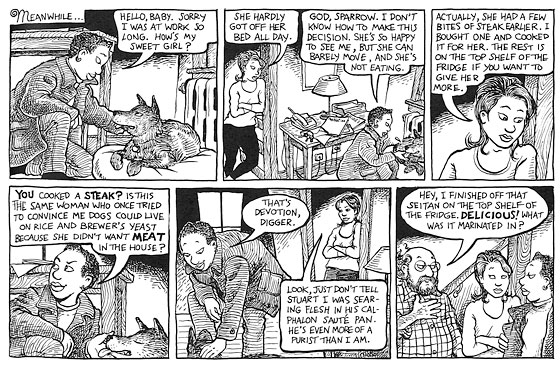
“The longer I wrote about these people, the fewer possibilities were open to everyone based on the choices they made. Everyone’s lives started to narrow,” says Alison Bechdel. She’s talking about the characters of “Dykes to Watch Out For,” her subcult-classic comic strip that has, since 1983, followed a group of crunchy lesbian friends—the sort of characters who argue about food-co-op shifts and whether eating meat is inherently patriarchal, and are utterly recognizable to anyone who’s spent time in Park Slope or Berkeley. Bechdel, a former New Yorker who moved to Vermont eighteen years ago, is best known for her graphic family memoir, the National Book Critics Circle Award finalist Fun Home (2006), and has just published a big “Dykes to Watch Out For” collection (Houghton Mifflin)—which roughly coincides with the strip’s final serial appearance. “I do miss that chance to sort of take the chaos of my life every two weeks and put it into some kind of order,” she says. “Even if it wasn’t strictly autobiographical, just taking what was happening in the news and trying to make sense of it to myself.” She admits that even though a lot of the lefty newspapers that published “Dykes” have gone out of business, it was tough to retire the strip. “It’s almost physically painful. I put so much of myself into this work, and it supported me for a long time; it had a loyal, wonderful audience. But I am on a deadline for another memoir, and it’s due in a year, and there’s no way I could keep producing these and do that work. It took me seven years to do Fun Home, partly because I was two-weeks-on-two-weeks-off for that whole time. I’ve never had the luxury of just completely immersing myself in one project.” Coincidentally, the series comes to a close just as a liberal Democrat arrives in the White House. “The strip is very much of an era,” she says, noting that the early strips are a sort of time capsule of stridency and activism during the Reagan years. “Things are much more black-and-white when you’re in your twenties. I think the comic strip was initially dogmatic and didactic and gets grayer as we go on. ”